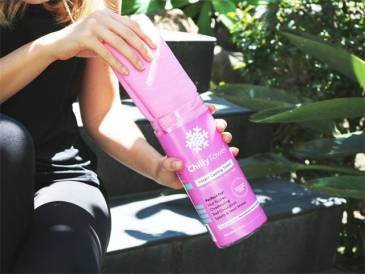Dr Shobhan Manoharan Hyperhidrosis Interview

The Impact of Heavy Sweating
Sweating is the body's natural way of cooling off. But it's one of those awkward beauty issues we don't have control over or enjoy talking about even though we have to deal with every day.
Sweating can leave many of us paranoid. We sweat when we're nervous or during an important event like a presentation that gets us all hot and flustered.
When we excessively sweat, we avoid shaking hands, hugging, raising our arms or have to wipe our hands from the build-up of sweat on our computer mouse. It can also determine the type of clothes we wear for fear of showing sweat marks or leaving stains.
Although millions of people suffer from severe primary axillary (underarms) hyperhidrosis, very few speak to their doctor despite the significant impact it has on their daily lives including:
Social embarrassment and difficulty being in public situations
Impact on their ability to perform at work
Difficulty meeting people and developing personal relationships
Needing to change clothes multiple times a day and not being able to wear certain colours/particular materials
Time and energy looking after personal hygiene
For more information, head to excessivesweatinghelp.com.au
 Interview with Dr Shobhan Manoharan, Specialist Dermatologist, MBBS, FACD
Interview with Dr Shobhan Manoharan, Specialist Dermatologist, MBBS, FACD
Dr Manoharan is a highly regarded, prominent dermatologist who is actively involved in the training of dermatology registrars, medical students, general practitioners and pharmacists in all aspects of dermatology and is involved in public education with respect to skin care, skin cancer prevention and surgical and rejuvenation options.
Building on over a decade of dermatology experience in Queensland, Brisbane Skin has opened its doors to bring you the ultimate dermatological care in Queensland. It is a unique concept in dermatology in Queensland, combining the best of medical care with state-of-theart laser and surgical technology in a luxurious, welcoming environment to make your entire experience relaxing and enjoyable.
Question: What is classified as heavy sweating?
Dr Shobhan Manoharan: This is really a question of severity and a spectrum that becomes hyperhidrosis. If people sweat heavily and appropriate to their level of physical activity or external heat, this is normal.
Question: At what point does heavy sweating become hyperhidrosis?
Dr Shobhan Manoharan: When heavy sweating is disproportionate to the level of physical activity or exertion, and external heat, then this is classified as hyperhidrosis (HH).
HH can be primary or secondary. Primary HH is when there is an overactivity in the part of the brain that controls your body's temperature, causing the sweat glands to produce more sweat than usual. This can be made worse by anxiety, exercise, weather and spicy foods.
Secondary HH occurs when neurological conditions such as a tumour, stroke or hormonal problems are present. It can also take place when drugs such as antidepressants, caffeine or amphetamines are in the system.
Question: Why is it important that we speak to our Doctor if we fear we have hyperhidrosis?
Dr Shobhan Manoharan: HH can have a significant physical and emotional impact on individuals, and you should speak to your doctor as there are effective treatments available in most cases. Also, in certain situations, your doctor may organise some investigations to rule out a secondary cause for your HH.
Question: How does heavy sweating often effect an individual?
Dr Shobhan Manoharan: Physically it may cause problems with being able to hold pens and implements, and gripping especially when involving hands. Patients may find they need to change their clothing and undergarments multiple times a day, even in the middle of winter, and find they ruin their clothing more rapidly than expected. They may have to keep jackets and coats on to hide sweat stains, and also prefer dark clothing to make the sweat stains less obvious. They struggle emotional and psychological embarrassment and may find it difficult to interact socially and professionally. Shaking hands and physical contact with others becomes an awkward and uncomfortable proposition for many. Their daily activities are regularly compromised.
Question: Are there easy ways to manage hyperhidrosis?
Dr Shobhan Manoharan: From the individual's perspective, in the first instance, having a healthy diet and balanced lifestyle is important. Avoid drugs, drink alcohol in moderation, and maintain a healthy body mass index. Keep cool with fans and air-conditioning if possible. First-line treatments available at pharmacies include high-concentration anti-per spirants with Aluminium chlorhexahidrate.
Question: What are the treatment options for hyperhidrosis?
Dr Shobhan Manoharan: If the above techniques and methods are insufficient, there are several treatment options that are available at a specialist level for HH. For axillary HH (armpit sweating), injectables can be very effective and can provide sweat clearance for about 5 months. It is generally performed under an anaesthetic gel, is relatively pain-free and is done in less than five minutes. For more stubborn axillary sweating, or for those looking at a more permanent solution, MiraDry is a technique that utilises microwave energy to eradicate the overactive sweat glands. 2 treatments spaced about 2 months apart usually reduces sweating by about 80%. Surgical options are also available, but have potential side-effects and complications, and are largely last resort since the advent of MiraDry.
For patients with palmoplantar hyperhidrosis, a technique known as iontophoresis is available, whereby a medication in applied to water in an iontophoresis device and then palms or soles are immersed in the mixture. A low-level electric current is then passed through, leading sweat glands being stunted.
When HH affects larger areas of the body (generalised HH), localised treatments are often not feasible, and the best option may be tablets; these can be prescribed safely by experienced specialists for good results.
For more information, visit excessivesweatinghelp.com.au.
Interview by Brooke Hunter
Have You Seen This?
MORE







